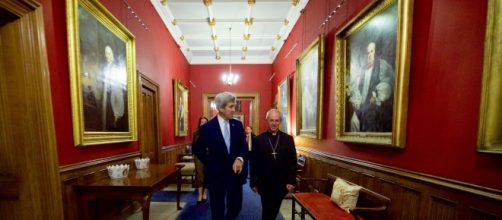The Archbishop of Canterbury, Justin Welby, has said that a radical approach is needed to tackle the ever-widening social divide. In an interim report by the IPPR think tank established last year, the Archbishop and prominent business leaders have highlighted the growing divide between the wealthy and the poor. Despite the UK's recent economic recovery, workers find themselves worse off than before, because gains have increased business profits rather than wages. As a result, corporations along with the top echelons of society are getting wealthier, while workers continue to struggle with the effects of austerity.
There is profound economic injustice in the UK. We must face this with boldness and act with vision: https://t.co/Ft5kpAySoU
— Justin Welby ن (@JustinWelby) September 6, 2017
Current government policies aren't working
According to the IPPR, current Government Policies are exacerbating the social divide and related social problems. To tackle the growing social divide, the commission proposes fundamental reforms in the UK's Economic Model. Rather than fuelling the divide by delivering economic gains to the richest in society and corporations, wage increases and investment in infrastructure should form the basis of a new economic model. While the GDP saw a rise of 12 percent since 2010, average worker earnings have in fact fallen by 6 percent according to analysis carried out by the commission.
Workers are struggling to make ends meet despite the UK's economic recovery since the 2008 crash.
Broken UK economic model needs radical overhaul
The Archbishop of Canterbury and the commission called on politicians to take an honest look at policies and examine the impact on social equality. Reacting to criticism of government policies, the chancellor, Philip Hammond, rejected suggestions that the government had fuelled the social divide while pointing at falling unemployment rates.
He did, however, acknowledge the need for investment in infrastructure, housing, R&D, and technical education.
The shadow chancellor, John McDonnell, reacted to the IPPR's report by reiterating Labour's belief that Tory policies had long favoured the wealthiest and failed those on low incomes and the unemployed.
Report suggest economy is not raising living standards for a majority of the population
According to Tom Kibasi, director of the IPPR, "We don't have a British economic model. We have an economic muddle." He went on to point out that a growing economy no longer raised the living standards of a majority of the population which represented a sharp departure from the "economic promise that has underpinned British society since the second world war."
The report also called for an examination of the role of banks and financial services sector and further suggested strengthening trade unions to protect workers against the demands of company shareholders.
The full report is due for publication next autumn and is expected to contain a number of initiatives to form the basis of a new and more sustainable economic model.


